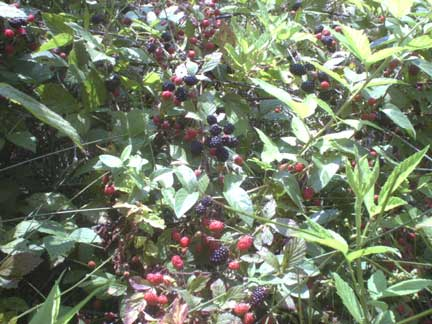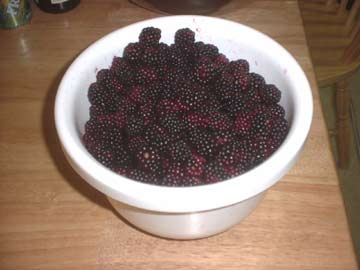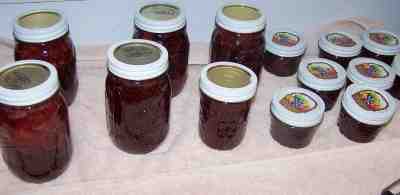
Blackberry U-Pick Orchards in Southern Connecticut in 2024, by county
Below are the U-Pick orchards and farms for blackberries that we know of in this area.
Not all areas of a state have blackberries orchards that are open to the public. If you know of any others, please tell us using the add a farm form!
Remember to always check with the farm's own website or Facebook page before you go - or call or email them if they don't have a website or Facebook page. Conditions at the farms and crops can change literally overnight, so if you want to avoid a wasted trip out there - check with the farm directly before you go! If I cannot reach them, I DON'T GO!
PLEASE report closed farms, broken links and incorrect info using the "Report Corrections" form below.
New Haven County
- Emerald Green Farm and Gardens - Minimizes chemical and pesticide use, apples, apricots, blackberries, blueberries, nectarines, pears, peaches, plums, raspberries (red), raspberries (black), Fresh eggs, gift shop, restrooms
84 Tankwood Road, Wallingford, CT 06492. Phone: 203 -949-0594. Open: Monday to Friday, from 9 am to 4 pm Saturday and Sunday, from 10 am to 3 pm Phone for holiday hours. Directions: . Click here for a map and directions. Payment: Cash, Check. emerald green farm@sbcglobal.net Blueberries: Late June through September peaches and plums : July through September Apples: Late July through November. We minimize use of pesticides and other chemicalsGreenhouses with a large selection of annual flowers and hanging baskets Country store and garden center gift shop.
Blackberry
Blackberry Picking Tips, Recipes and Information
 Blackberries typically peak during June in the South
of the U.S., and in July in the north and in Canada. Crops are ready at various times of the month depending on which part
of the state you are located. In order to produce good local Blackberries, producers depend on ideal spring and early summer weather conditions.
See this page for a list of blackberry festivals around the U.S.
Blackberries typically peak during June in the South
of the U.S., and in July in the north and in Canada. Crops are ready at various times of the month depending on which part
of the state you are located. In order to produce good local Blackberries, producers depend on ideal spring and early summer weather conditions.
See this page for a list of blackberry festivals around the U.S.
Before you leave to go to the farm:
- Always call before you go to the farm - And when they are in season, a large turnout can pick a field clean before noon, so CALL first!
-
Leave early. On weekends, then fields may be picked clean by NOON!
-
Most growers furnish picking containers designed for Blackberries, but they may charge you for them; be sure to call before you go to see if you need to
bring containers.
If you use your own containers, remember that heaping Blackberries more than 5 inches deep will bruise the lower berries. Plastic dishpans, metal oven pans with 3 inch tall sides and large pots make good containers. I like the Glad storage containers like the one at right. - Bring something to drink and a few snacks; you'd be surprised how you can work up a thirst and appetite! And don't forget hats and sunscreen for the sun. Bugs usually aren't a problem, but some deet might be good to bring along if it has been rainy.
Tips on How to Pick Blackberries
- There are two types of blackberries to know about: thorny and thornless! Obviously, the thornless are easier to pick, but some people claim the thorny varieties are sweeter. With the thorny plants, you want to reach into the plant in the gaps, so you don't need to touch anything but the berry you're after, avoiding the thorns.
- A ripe blackberry is deep black with a plump, full feel. It will pull free from the plant with only a slight tug. If the berry is red or purple, it's not ripe yet.
- Repeat these operations using both hands until each holds 3 or 4 berries. Unlike strawberries, blackberries are usually pretty tough, I dump mine into the bucket. Repeat the picking process with both hands.
- Don't overfill your containers or try to pack the berries down.
General Picking Tips
Whether you pick Blackberries from your garden or at a Pick-Your-Own farm, here are a few tips to keep in mind:
- Pick only the berries that are fully black. Reach in between the stems to grab for hidden berries ready for harvest. Bend down and look up into the plant and you will find loads of berries that other people missed!
- Avoid placing the picked berries in the sunlight any longer than necessary. It is better to put them in the shade of a tree or shed than in the car trunk or on the car seat. Cool them as soon as possible after picking. Blackberries may be kept fresh in the refrigerator for up to a week, depending upon the initial quality of the berry. After a few days in storage, however, the fruit loses its bright color and fresh flavor and tends to shrivel.
When you get home
- DON'T wash the berries until you are ready to use them or freeze them. Washing makes them more prone to spoiling.
- Pour them out into shallow pans and remove any mushed, soft or rotting berries
- Put a couple of days supply into the fridge, wash off the others, drain them and freeze them up! (Unless you're going to make jam right away) Blackberries are less perishable than blueberries or strawberries, but refrigerate them as soon as possible after picking. Temperatures between 34 F and 38 F are best, but, be careful not to freeze the blackberries (while they are in the fridge)!
- Even under ideal conditions blackberries will only keep for a week in a refrigerator, so for best flavor and texture, use them as soon as possible after purchase
Blackberry Recipes, Freezing and Jam directions
- How to make Blackberry jam - It is VERY easy - especially with our free Blackberry jam directions - very easy!
- How to make Blackberry jelly
- How to freeze berries
- Blackberry syrup, make and can it!
- Seedless blackberry pie!
- Blackberry Festivals: Where, When and More to Find an Blackberry Festival Near You this year:
Blackberry Facts and Tips
-
 Black Raspberries, also
known as "black caps" are a very healthy food; packed with anthocyanins!
Black Raspberries, also
known as "black caps" are a very healthy food; packed with anthocyanins! - The USDA says 1 cup of blackberries has about 62 calories.
- 1 cup of blackberries, not packed down weighs about 140 grams.
- Select plump, firm, fully blackberries. Unripe berries will not ripen once picked.
- Ohio State University's Article Regarding Their Prevention of Cancer
- Oregon Berry Black Raspberry Brochure
- Blackberry tea was said to be a cure for dysentery during the Civil War. During outbreaks of dysentery, temporary truces were declared to allow both Union and Confederate soldiers to "go blackberrying" to forage for blackberries to ward off the disease.
- Blackberries were enjoyed by the ancient Greeks, who believed them to be a cure for diseases of the mouth and throat, as well as a preventative against many ailments, including gout.
- The blackberry leaf was also used as an early hair dye, having been recommended by Culpeper, the English herbalist, to be boiled in a lye solution in order to "maketh the hair black".
- Guide to blackberry varieties
- Researchers have known for quite some time that berries contain antioxidants which help to fight cancer causing free radicals. A study at the University of Ohio has found that blackberries are the most potent cancer fighting berries of them all, by nearly 40 percent!
- U-pick Blackberry farms typically sell berries by the pound. A quart equals 1 and 1/2 pounds of fresh berries.
- Do the math and be careful not to over-purchase as Blackberries quickly mold when left at room temperature, and only last a couple of days in the refrigerator.
- You can easily freeze berries that you cannot use right away - just wash, cut the hulls off and pop them into a ziplock bag, removing as much air as possible. Those vacuum food sealers REALLY do a good job of this! The berries will keep for many months frozen without air.
- Want to go to a blackberry festival? See this page for a list!
Other Local Farm Products (Honey, Horses, Milk, Meat, Eggs, Etc.)
(NOT pick-your-own, unless they are also listed above)
- Farm markets and roadside stands
- Local Honey Finder
- Local Meat, Milk and Eggs
- Venues: Farms, Wineries, Orchards for your event, wedding or party
- Easter egg hunts
- Children"s consignment sales
- Fruit and vegetable festivals
- Winery tours and wine tastings
- Horse rides, stables, lessons, trails
- Maple Syrup farms and sugarworks
- Bed & Breakfasts on Farms, Wineries, Ranches and Orchards
- Pumpkin patches
- Corn mazes
- Zombie Paintball venues
- Christmas Tree Farms & lots
- Environmental resources
- Consumer fraud information
- Wholesale food sources
- Resources for Farmers
Looking for canning equipment and supplies?
Water bath canner with a jar rack
Pressure canners for gas, electric and induction stoves: Presto 23Qt or T-fal 22Qt
Canning scoop (this one is PERFECT)
Ball Blue book (most recent version)
Jars: 8oz canning jars for jams
Find Other types of farms:
Farm markets and roadside stands
Road trips and camping resources
Local Honey, apiaries, beekeepers
Consumer fraud and scams information
Home canning supplies at the best prices on the internet!
Maple Syrup Farms, sugarworks, maple syrup festivals
Environmental information and resources
Farms For Your Event for birthday parties, weddings, receptions, business meetings, retreats, etc.
Festivals - local fruit and vegetable festivals
Get the
most recent version of
the Ball Blue Book
With this Presto 23 quart pressure canner and pressure cooker, you can "can" everything, fruits, vegetables, jams, jellies, salsa, applesauce, pickles, even meats, soups, stews. Model 01781

You can make jams, jellies, can fruit, applesauce, salsa and pickles with water bath canners, like this Granite Ware 12-Piece Canner Kit, Jar Rack, Blancher, Colander and 5 piece Canning Tool Set

